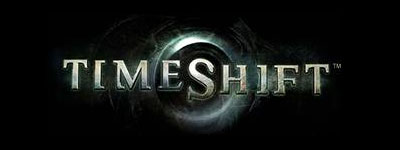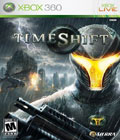Genre: First-Person Shooter
Publisher: Sierra Entertainment
Developer: Saber Interactive
Release Date: November 20, 2007
In terms of video game genres, Sierra's TimeShift is like a duck-billed platypus, an animal possessing perhaps superficial traits defying easy classification. Such beasts are about as popular with gamers as they are with zoologists; people like their categories well defined. On this point alone, before it's even out of its box, TimeShift faces an uphill battle in the oversaturated video game market of the holiday season.
The title's primary area is futuristic first-person shooter. In the FPS market, you have almost entirely the World War II shooter, the futuristic shooter and the generic military shooter, the latter often including near-future elements, making it difficult to distinguish from the other two on the military point and in the future-tech aspect. Of those vaguely three FPS sub-genres, the futuristic shooter is by far the most common. Never mind the bulk of TimeShift is set in what seems an alternate history back in the first half of the 20th century; its point of origin, and its weapons and various technologies, are futuristic. And in that, it will seem common.
The second, more innovative mechanic, lending the game its name, is the ability, via the player's Beta Suit, to control time in three ways: slow it down, reverse it, or stop it cold — all for a brief period, as the suit's "time batteries" are temporarily emptied before recharging themselves in short order. The game designers have gone to good lengths to make the three time manipulations integral to playing. Unfortunately, save for solving simple progression or pathfinding puzzles, time-shifting is not forced on the player. For the most part, the mechanism will be used in combat to slow down or freeze enemies so you can run right up to them and unload one of a broad selection of weapons while they're completely defenseless. In this aspect, TimeShift will play like the popular shooter F.E.A.R., and therefore will be accused of appropriating its entire gameplay design from this older game. It's not a perfectly fair indictment: Although the visual representation is the same, the theme in F.E.A.R. is artificial reflex enhancement, both of the player and the enemy combatants; in TimeShift, it's actually about time manipulation, although many FPS gamers, especially those who don't play the title thinking in four dimensions, will call that a distinction without a difference.
In creative endeavors — call it inspiration, homage, whatever — good ideas are stolen. Get used to it. The central hook in F.E.A.R. was stolen from Max Payne, which in turn stole it from the Wachowski brothers and their "Matrix" film franchise … who, of course, ripped it off from Hong Kong action director John Woo while he wasn't looking. Yet in that long heritage of alleged pilfering, the least guilty party is TimeShift, as it's actually the only one with anything to do with time. In "The Matrix," Neo, played by Keanu Reeves, doesn't slow time; the Wachowski boys merely borrowed Woo's style to visually represent Neo's heightened physical reflexes. Likewise, F.E.A.R.: Your enemies are genetically enhanced for super-fast assaults; the slow-motion effect in F.E.A.R. is used only to represent the player's own temporary reflex enhancement to meet or beat that of in-game opponents. The "bullet time" of Max Payne, is, like Woo's films, merely cinematic style. TimeShift uses the same type of effects for visual representation of the player's messing with time, but time manipulation is, unique from all others, the key concept.
Although there are a few cut scenes scattered throughout the single-player campaign, TimeShift's plot is purely background, and if intended to drive the action forward, it does not. But the action itself does a fair job of driving the action ahead, so the absence of a fully realized plot with substantial, high-quality voice acting both in-game and within cut scenes does not significantly detract from the pure shooter experience.
Graphically, TimeShift is suitable for an HD console like PlayStation 3, but it's hardly a visual treat. Character models and animations are good; draw distance is reasonable even in large, open areas; and textures look nice until closely examined. However, in comparison not only with this autumn's graphical high-water mark, the photorealistic Call of Duty 4, but also with other less eye-popping yet visually superb games, TimeShift will garner no accolades. The overall presentation of menus, loading screens and the like look rather dated, but they are organized, orderly and don't get in the way of playing the game.
Audio and sound effects in the game are likewise sufficient but do not excel. The best effects are the weapons discharging, as appropriate for an FPS title, and TimeShift gets a good mark on that point. The musical score is uninspired but so subdued within the game it's not likely possible it will trouble players.
Controls are as they should be for the an FPS of this breed: They follow standard shooter conventions, they're easily remembered and almost always responsive; the time-shifting feature is triggered by tapping one shoulder button — a default response determined by the game as most suited to the immediate circumstance — or holding down the same shoulder button and pressing one of the four face buttons to initiate a user-controlled time-shifting action. It's uncomplicated and easy to execute, even under fire or otherwise absorbed in complex balance acts.
Gameplay is straightforward shooter, with a few obligatory, simple pathfinding puzzles throw in, most of which require brief use of a time-shifting action to solve. There are moments of occasional frustration, as after playing TimeShift for a while, you come to expect all the puzzles must be solved with a time manipulation, yet there are a few situations for which progressions requires you first find and flip a switch, or something similar, and then, perhaps, execute a time freeze.
TimeShift includes auto-save points along the campaign, as well as the ability to save anywhere at anytime as initiated by the player. Quick-loading after you die loads the most recent save, be it a player's save or a game waypoint auto-save. If you use the intermittent save feature, you should know it's possible to create your own sort of real-world time paradox, where you save past the point you should have initiated a time manipulation. You can't reverse time past the save point, and it's too late to trigger the time action, therefore it is impossible to progress in the game. I experienced such a thing some way into the campaign. I kept dying in the same place, quick-loading my last save from the menu — my personal save, not a game-triggered auto-save — and then immediately dying all over again. I tried everything.
Then, horror of humbling horrors, I can barely admit this, I asked for help on the Internet. I was quickly answered by a few people who'd played the game in its Xbox 360 incarnation, which has been available longer. They all suggest one of two things, both time-control actions, either of which should work. These things did not work. I grumbled, I cursed, I eventually screamed. I sat on the sofa at four in the morning wracked with sobs, sinking into a desperate, deep depression. I was on the verge of calling my editor and telling her I couldn't get through enough of it for a fair review; after that, by the honor code of FPS players, I would have had to fall on my own sword.
But, while considering the odds that jumping from our two-story roof would only break my leg, through the veil of tears I watched the game's loading screen offer a rotating, ostensibly helpful gameplay hint for perhaps the hundredth time. This one was something about the AI chip in the Beta Suit sometimes preventing the initiation of a time reversal operation, should that operation potentially create a time paradox. Okay, yeah, sure. Makes sense. In the game.
Finally it dawned on me I should have done something related to time manipulation prior to the point at which I saved. The problem is easily solved going back another save — certainly going back no farther than the last game-triggered auto-save — repeating the section, and this time performing the required action at the right time. I went back to the closest auto-save and was rewarded by waltzing through that mess in about a minute. If I can't prove to you that TimeShift is truly unique in its gameplay by the fact the damn game stepped out of my PS3 and, essentially in the real world, did to me what it only pretends to do in the game world, I've no further argument to offer.
Much was put into TimeShift's multiplayer modes, maps and gameplay mechanism. The developers even did a great job including the time-shifting element, equally distributing the power of time manipulation in online matches without creating undue advantages for some players. There are also numerous, fine-grained customization features that hosts may determine for their games. Although some online matches are slow and stutter a bit, this problem seems dependent almost entirely on the host — hosting 16 players on a bargain DSL connection with a low-cap upstream data rate is always a fool's errand; many matches play as smoothly as any other online shooter for PS3. Unfortunately, TimeShift's online lifespan will be limited by the big-hitter online titles on the market right now. Perhaps, and the game is so deserving, TimeShift will in late winter emerge as an online cult favorite as avid gamers have worn thin the titles they've picked up around the holidays.
Ultimately, TimeShift's most significant flaw is in going soft, not forcing the player to make better, more creative use of the time manipulation feature. You can, more or less, blast your way through in stock shooter style; most players will assuredly choose this path of least resistance. You can do some amazing or hilarious things, oftentimes both, with your time-shifting powers, but you are never required to do any greater analytical thinking than that required of the usual puzzle-solving in standard shooters. I can't in good conscience assign a low score to this game. It's not a poor, weak or lacking example of the genre; it's a fine example of the genre. Time-shifting or no, it plays like a traditional, exciting, sometimes intense FPS, but it's been released in the face of several exceptional examples of FPS titles. Six months from now, during the midst of the annual games drought in new titles, shooter games no better than TimeShift will be favored by some, if not many, critics and will also sell well to a thirsty FPS audience. To significantly mark off this title right now would be, if you'll pardon the pun, merely a matter of timing.
Score: 8.5/10
More articles about TimeShift











 TimeShift is an innovative FPS in which players control time to complete missions and defeat foes, TimeShift will leverage first-of-its-kind gameplay abilities and functionality, the latest graphics technology, and high production values to create a truly unique action game experience.
TimeShift is an innovative FPS in which players control time to complete missions and defeat foes, TimeShift will leverage first-of-its-kind gameplay abilities and functionality, the latest graphics technology, and high production values to create a truly unique action game experience.












































